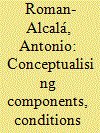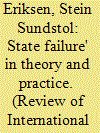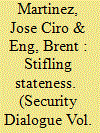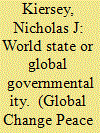|
|
|
Sort Order |
|
|
|
Items / Page
|
|
|
|
|
|
|
| Srl | Item |
| 1 |
ID:
146658


|
|
|
|
|
| Summary/Abstract |
This paper addresses the ambiguity of the term ‘sovereignty’ in food sovereignty (FS), intending to clarify the ‘aspirational sovereignty’ that food sovereignty movements indicate as the ideal configuration of power that would allow FS to flourish, or which might help measure movement towards FS. Since aspirational sovereignty is conditioned by existing power relations, the paper elaborates components of ‘actually existing sovereignty’, based on readings of a variety of political and social science literatures. By critically assessing the difference between actually existing and aspirational sovereignty across three geographic–political levels, the paper offers strategic options for constructing FS, and suggests what such an elaborated definition of FS’s sovereignty might offer future research on FS.
|
|
|
|
|
|
|
|
|
|
|
|
|
|
|
|
| 2 |
ID:
134370


|
|
|
|
|
| Summary/Abstract |
Afghanistan is often mentioned as a threat to the Central Asian states. Potential spillovers of violence, extremism, terrorism and dangers related to the drug trade are seen as significant security issues for the region. This article takes a different approach. Taking a performative view of statehood, we see state identities as socially constituted, partly by involvement in regional and global processes. From research on border management, the Northern Distribution Network, and various forms of bilateral cooperation between Afghanistan and the Central Asian states, we argue that Afghanistan has become an arena where the Central Asian states can participate. How the Central Asian states bordering on Afghanistan are treated as relevant participants, regardless of actual state capacity or the effectiveness of their policies, serves to constitute and confirm their sovereignty and relevance to the international community, and ultimately their statehood. By emphasizing the important state effects of their performance, our perspective differs from accounts of Central Asian states as either ‘weak’ or ‘strong’, and the tendency to depict Central Asian engagement in regional initiatives as mere window-dressing.
|
|
|
|
|
|
|
|
|
|
|
|
|
|
|
|
| 3 |
ID:
101743


|
|
|
|
|
| Publication |
2011.
|
| Summary/Abstract |
This article provides a critique of the discourse of 'failed states', and outlines an alternative approach. It is argued that by taking the model of the modern state for granted, and by analysing all states in terms of their degree of correspondence with or deviation from this ideal, this discourse does not help us understand the nature of the states in question, or the processes that lead to strong or weak states. Instead, the idea of the state should be treated as a category of practice and not as a category of analysis. Post-colonial state formation could then be analysed by focusing on the inter-relationship between the idea of the state and actual state practices, and on the ways that states have become linked to domestic society on the one hand and their relations with the external world on the other.
|
|
|
|
|
|
|
|
|
|
|
|
|
|
|
|
| 4 |
ID:
160448


|
|
|
|
|
| Summary/Abstract |
This article assesses the impact of the Assad regime’s aerial bombardment campaign on a frequently neglected component of Syria’s ongoing civil war: rebel governance. While analysis of the military and humanitarian ramifications of such attacks has been extensive, these perspectives fail to consider how the Assad regime’s counter insurgency efforts subvert governance practices by Syria’s diverse rebel groups. Drawing on performative approaches to the ‘state’, we argue that opposition groups’ daily enactments of ‘stateness’ via two key welfare services – bread and healthcare provision – constitute a historically inflected and locally grounded critique of the incumbent. When executed successfully, such enactments can stabilize relations between rulers and ruled while offering a vision of an alternative polity. They can also attract the attention of rivals. The Assad regime’s aerial bombing campaign of rebel-held areas is thus neither a haphazard military strategy nor simply the product of long-standing sectarian hatreds, but a deliberate tactic through which it seeks to destroy a key threat to its authority.
|
|
|
|
|
|
|
|
|
|
|
|
|
|
|
|
| 5 |
ID:
085720


|
|
|
|
|
| Publication |
2008.
|
| Summary/Abstract |
Abstract This article addresses recent theoretical discussion about the state under conditions of globalisation, focusing in particular on recently popular 'world state' theory, as articulated by Martin Shaw and Alexander Wendt. It suggests that while world state theory is useful to the extent that it historicises the function of the state, it can be challenged for its uncritical approach to the question of how state power is actually constituted. To make this argument, the article refers first to an emerging Marxist critique that focuses on liberal hypocrisy and the role of imperial violence in the formation of the world state. However, while this approach reveals the elision of many forms of violence in world state theory, it shares world state theory's tendency to avoid exploring the role of more constitutive forms of power. Challenging this view, the article turns to Foucault's theory of governmentality and some recent applications of it to Imperialism, Empire, and the War on Terror.
|
|
|
|
|
|
|
|
|
|
|
|
|
|
|
|
|
|
|
|
|